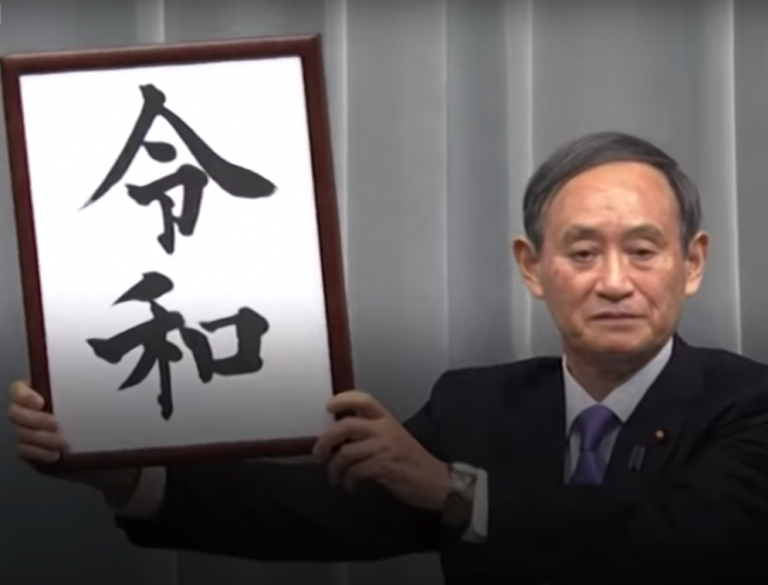A special panel has chosen the new era name for Japan following the expected abdication of the island country’s current emperor, Akihito, on April 30.
Each Japanese emperor has an era name, or gengo (元号) in Japanese. The current era under Akihito is Heisei (平成), which began in 1989 and means approximately “peace on earth.”
On April 1, at a press conference, Chief Cabinet Secretary Yoshihide Suga announced that the new era name would be Reiwa, while holding up a sheet showing the handwritten Chinese characters 令和 that form the new name.
Reiwa, which can be translated as “beautiful harmony,” has an unconventional background. Unlike previous era names, the two Chinese characters are sourced from the Man’yōshū, a classical Japanese collection of poems. This makes Reiwa the first Japanese era name not chosen from classical Chinese texts.
The new name will be adopted at the planned ascension of crown prince Naruhito to the Chrysanthemum Throne. He will become the 126th Emperor of Japan, which has the oldest surviving monarchy in the world.
Success
You are now signed up for our newsletter
Success
Check your email to complete sign up
A team of nine scholars, retired officials, and industrialists, among which two were women, deliberated on possible era names for the incoming emperor. According to The Japan Times, Reiwa was added to the list of candidates very late in the selection process.
Japanese Prime Minister Shinzō Abe said that Reiwa represents “a culture being born and nurtured by people coming together beautifully.”

Japanese Prime Minister Shinzo Abe said that Reiwa represents ‘a culture being born and nurtured by people coming together beautifully.’ (Image: mackwo7 via Pixabay/CC0 1.0)
The characters rei (令) mean “beautiful” or “fine, and wa (和) is a term that means harmony, peace, or union. It is also associated with Japan, which used to be known as the kingdom of Wa in old Chinese writings. The word rei has never been used in a Japanese era name.
Because the character rei is used in the Chinese or Japanese terms that mean “command,” some Japanese felt it was too harsh. However, the Japanese government clarified that, based on the context in which rei appeared in its source, it did not carry this meaning.
Despite it being widely reported that Reiwa did not come from a classical Chinese text, Japan’s Asahi Shimbun interviewed two scholars who found the two characters in a Chinese poem by Zhang Heng that dates to the 2nd century A.D. The Man’yōshū, the Japanese poetry collection that Reiwa was chosen from, was compiled in the 8th century.
Follow us on Twitter or subscribe to our weekly email

















